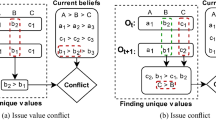Abstract
Along with the great success of superhuman AI in succession, the development of Texas Hold’em poker agents is entering a new stage. The efforts to create indefectible AI transfers to develop new AIs which can exploit opponents and explain its own decisions better. Hand odds estimating used to state abstracting, situation evaluating, decision assisting is one of the key foundations for such new agents. But all the current methods implicitly assume a uniform distribution over the cards the opponent could be holding, which makes the win rate over-evaluated. In this paper three hand odds estimating methods considering the opponent hand belief are proposed to cope with this problem. We suggest the expected win rate algorithms with start hand range (EWR-SHR) and expected win rate algorithm with fold rate (EWR-FR) for preflop round and flop/turn/river round respectively. These two algorithms predict the opponent’s hand range based on the opponent model and observed action not fold, their additional computation complexity is O(1). The expected win rate algorithm with opponent hand distribution (EWR-HD) is the third method suitable for all rounds which uses the opponent model and observed action check/call/raise to infer the distribution of the opponent hand cards. Their features are compared, usages are summarized, and the experiment result indicates that all of them can evaluate the game situation more precisely than the current methods.
Access this chapter
Tax calculation will be finalised at checkout
Purchases are for personal use only
Similar content being viewed by others
References
Bard, N., Foerster, J.N., Chandar, S., Burch, N., Lanctot, M., et al.: The hanabi challenge: a new frontier for AI research. Artif. Intell. 1, 1–35 (2019)
Billings, D.: Computer poker, pp. 1–46 (1995)
Billings, D.: Algorithms and assessment in computer poker, pp. 1–10 (2006)
Billings, D., Davidson, A., Schaeffer, J., Szafron, D.: The challenge of poker. Artif. Intell. 134, 201–240 (2002)
Billings, D., Papp, D., Schaeffer, J., Szafron, D.: Opponent modeling in poker. In: AAAI 1998 Proceedings, pp. 1–7. American Association of Artificial Intelligence (1998)
Bowling, M., Burch, N., Johanson, M., Tammelin, O.: Heads-up limit Hold’em poker is solved. Science 347(6218), 145–149 (2015)
Brown, N., Sandholm, T.: Superhuman AI for multiplayer poker. Science 365(6456), 885–890 (2019)
Chen, W., Ankenman, J.: The mathematics of poker. Conjeleo (2006)
Coding the wheel: The great poker hand evaluator roundup (2008). https://www.codingthewheel.com/archives/poker-hand-evaluator-roundup/
Da Silva, B.: Approximating poker probabilities with deep learning. arXiv preprint arXiv:1808.07220 (2018)
Ganzfried, S., Sandholm, T.: Safe opponent exploitation. ACM Trans. Econ. Comput. 3(2), 1–28 (2015)
Kev, C.: Cactus Kev’s poker hand evaluator (2000). http://suffe.cool/poker/evaluator.html
Lake, B.M., Ullman, T.D., Tenenbaum, J.B., Gershman, S.J.: Building machines that learn and think like people, pp. 1–10. Two Plus Two Publishing (2016)
Lee, H.: Poker hand evaluator (2016). https://github.com/HenryRLee/PokerHandEvaluator
Li, X., Jiang, X.H., Chen, Y.Z., Bao, Y.J.: Game in multiplayer no-limit Texas Hold’em based on hands prediction. Chin. J. Comput. 41(1), 1–18 (2018)
Li, X., Miikkulainen, R.: Opponent modeling and exploitation in poker using evolved recurrent neural networks. In: GECCO 2018, pp. 1–9. Association for Computing Machinery (2018)
Mealing, R., Shapiro, J.L.: Opponent modeling by expectation-maximization and sequence prediction in simplified poker. IEEE Trans. Comput. Intell. AI Games 9(1), 11–25 (2017)
Moravík, M., Schmid, M., Burch, N., Lis, V., Bowling, M.: Deepstack: expert-level artificial intelligence in no-limit poker. Science 356(6337), 508 (2017)
Newall, P.: Further limit Hold’em: exploring the model poker game, pp. 9–16. Two Plus Two Publishing (2013)
Prock, A.: Pokerstove (2002). https://github.com/andrewprock/pokerstove
Rubin, J., Watson, I.: Computer poker: a review. Artif. Intell. 175(5–6), 958–987 (2011)
Senzee5: Paul senzee on software (2006). http://www.paulsenzee.com/2006/06/some-perfect-hash.html
Silver, D., Schrittwieser, J., Simonyan, K., Antonoglou, I., Hassabis, D.: Mastering the game of go without human knowledge. Nature 550(7676), 354–359 (2017)
Teófilo, L.F., Reis, L.P., Cardoso, H.L.: Computing card probabilities in Texas Hold’em. In: 2013 8th Iberian Conference on Information Systems and Technologies (CISTI), pp. 1–6 (2013)
Teófilo, L.F., Reis, L.P., Cardoso, H.L.: Estimating the odds for Texas Hold’em poker agents. In: Proceedings of the 2013 IEEE/WIC/ACM International Joint Conferences on Web Intelligence (WI) and Intelligent Agent Technologies (IAT), vol. 2, pp. 369–374 (2013)
Timo, A.: Ompeval (2012). https://github.com/zekyll/OMPEval
Two Plus Two Newer Archives: Two plus two 7 card hand evaluators (2006). https://archives1.twoplustwo.com/showthread.php?t=288578
Wu, Z., Li, K., Zhao, E., et al.: L2e: learning to exploit your opponent, pp. 1–16 (2020)
XPokerEval: Xpokereval (2008). https://github.com/tangentforks/XPokerEval
Author information
Authors and Affiliations
Corresponding author
Editor information
Editors and Affiliations
Rights and permissions
Copyright information
© 2021 Springer Nature Switzerland AG
About this paper
Cite this paper
Hu, Z. et al. (2021). Odds Estimating with Opponent Hand Belief for Texas Hold’em Poker Agents. In: Fang, L., Chen, Y., Zhai, G., Wang, J., Wang, R., Dong, W. (eds) Artificial Intelligence. CICAI 2021. Lecture Notes in Computer Science(), vol 13069. Springer, Cham. https://doi.org/10.1007/978-3-030-93046-2_5
Download citation
DOI: https://doi.org/10.1007/978-3-030-93046-2_5
Published:
Publisher Name: Springer, Cham
Print ISBN: 978-3-030-93045-5
Online ISBN: 978-3-030-93046-2
eBook Packages: Computer ScienceComputer Science (R0)




